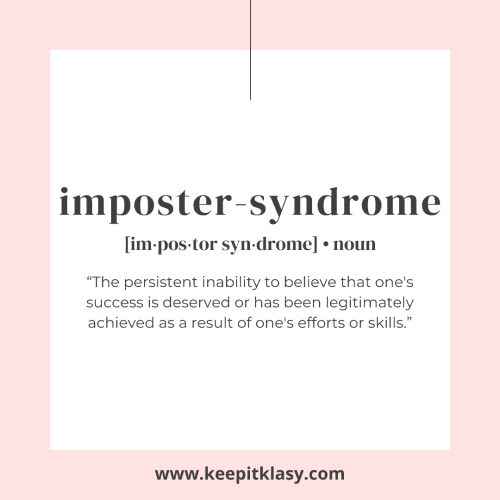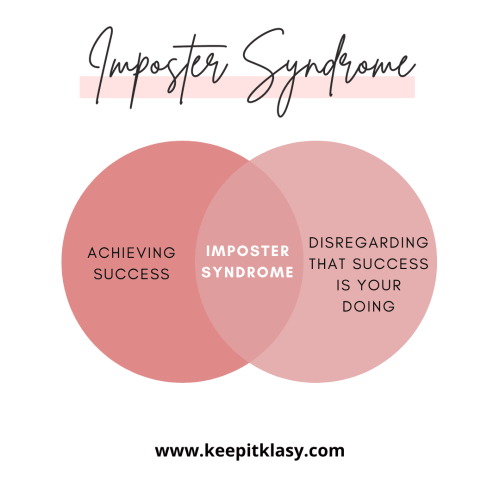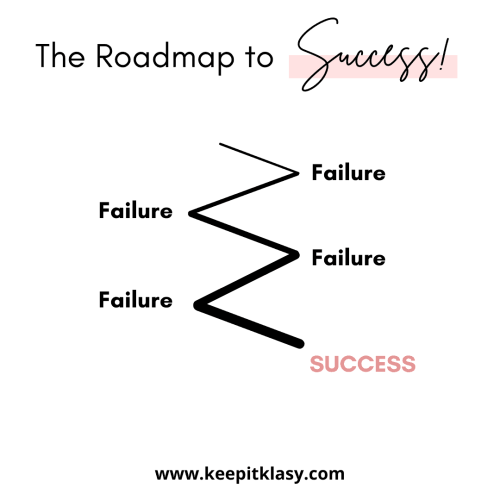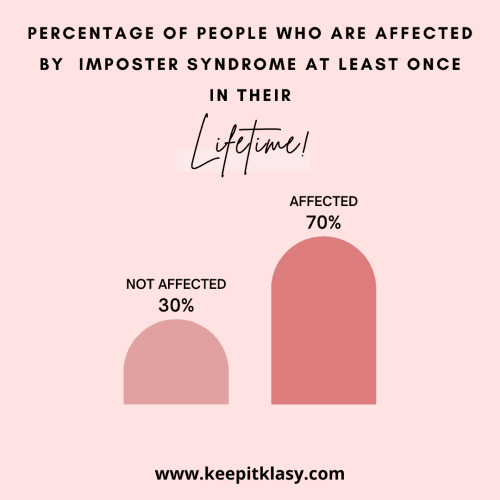
Hello, beautiful ladies. I was so excited to write this blog post because I will be discussing a very relevant topic and something that many of you might be struggling with or have struggled with in the past = say hello to imposter syndrome. If you are new to the topic you might still find this relevant, as my guess is that imposter syndrome is something most of us experience at least once in our lives. This post will be filled to the brink with everything there is to know and most importantly I will be covering proven ways to overcome imposter syndrome, how to stop the comparison game, and start living your life to the fullest…because my guess is, if you are here reading this you are made to lead that magical life.
I’ve experienced imposter syndrome.
The topic is close to my heart because imposter syndrome is something that I have dealt with, and I have no doubt will creep in again at some point. I often felt that I am not good enough or that I could be doing better. I have been my worse critic. I often felt inferior to those around me. So, if you are experiencing this feeling at the moment, just know that I understand. It is horrible and it can hold you back from living your life to the fullest. But I am also here to tell you that you can turn this around and get rid of this feeling once and for all. I hope that this post will help to turn things around for you and you’ll start your journey to unlimited self-love, self-acceptance, and the confidence to strive for your dreams.
So, let’s get into it.
This is going to be a long post. If you are well familiar with imposter syndrome, please feel free to scroll down to find the hacks on how you can overcome imposter syndrome. If you want to know a bit more about the topic and you are unsure if you might have it, I recommend reading from the top.
Disclaimer: This site contains affiliate links to products. We may receive a commission for purchases made through these links. Visit my disclaimer page for more information.
What is imposter syndrome?
The book definition of imposter syndrome is:
“The persistent inability to believe that one’s success is deserved or has been legitimately achieved as a result of one’s own efforts or skills.”

Imposter syndrome can mean different things to different people.
In reality, I think it can mean a lot of different things to different people. Everyone’s experience of imposter syndrome will be very different. In a broad sense, it refers to the idea that you may have doubts or worries about your abilities. You might feel like you are not worthy of success and that you lack the skills, knowledge to go after what you want. A lot of people also experience feeling like a fraud and often enter the comparison game. All these feelings come about despite a huge amount of evidence to the contrary.
Imposter syndrome can be situation-specific.
It could be situation-specific. For example, you might be a very outgoing person when you are around your friends but struggle to give presentations at work in front of your colleagues.
Imposter syndrome is not a reflection of how the world sees you.
Imposter syndrome is something that is deeply embedded within you. It hardly ever reflects how the outside world sees you. It is an opinion you have created about yourself that has stuck. Although previous external factors could have shaped your imposter syndrome, it is something that comes from within you.
People with imposter syndrome are not less capable they just do not believe in themselves.
How common is imposter syndrome?
Imposter syndrome is surprisingly common. I think most people experience it at least at some point in their life or in a particular situation or setting.
It is still a relatively new term, and it has spiked in popularity in recent years, but it is probably a feeling as old as humanity. Having a clear definition for this imposter phenomenon has massively pushed the conversation forward. With that, it became apparent that many people, especially successful people often suffer from it as well. It almost seems that the more successful you are the easier it is for you to enter the comparison trap and experience imposter syndrome.
Because let’s face it, in order to have imposter syndrome and feel unworthy of your achievement, you must be successful, and you must have achieved something.
However, the most important take-home message from all of this is that you are not alone in feeling this way.
Related Post:
What does imposter syndrome feel like?
Some common feelings you may experience:
- People see right through me, that I am not good enough.
- People think I am stupid.
- I am a fraud, and I am scared people will see I am not as capable as they think I am.
- I need to put this off until I have more knowledge experience or feel more confident.
- I am not worthy.
- What makes me think I am qualified for this role?
- Everyone has more experience than me.
- My succusses is down to luck or timing.

What does imposter syndrome look like?
Some things you might experience with imposter syndrome
- Constantly doubting your abilities.
- Procrastination on doing something that gives you discomfort.
- Keeping up the pretense that you know what you are doing.
- Fear that you won’t live up to expectations.
- Never happy with your work and striving for perfectionism.
- Setting very challenging goals and feeling disappointed when you fall short.
- Perceiving others’ expectations as considerably inflated.
- Sabotaging your own success.
- Ambitiousness and the need to be successful and achieve something significant.
- Wanting to be liked by others.
- People pleasing.
- An inability to realistically assess your competence and skills.
- Find it hard to take on board your achievements.
- Assuming that others have it more together than you.
Imposter syndrome causes.
You may wonder why people who seem to have it all, be super successful in all areas of their life with foul proof evidence, still, get imposter syndrome. What triggers imposter syndrome? I think this is very individual and it will be difficult to cover everything. However, I do think there are some things that greatly contribute to having imposter syndrome.
How you view your success.
As humans, we often attribute our successes and failure to either internal or external factors. For example, one person may believe that their top mark on an exam was purely based on luck, because of the question that came up, or because the timing was right. This person attributes their success to external factors and fails to give themselves credit for their good work – they are experiencing imposter syndrome. On the other hand, someone else will see that this mark was due to their hard work, persistence, dedication, and intelligence.
Imposters have a sort of double whammy because they often think that their success is due to external factors, (beyond their control) but their failures are due to internal factors (such as their lack of skill or intelligence).
Personality type.
Personality has a large part to play. In many cases, imposter syndrome may be the symptom of low self-esteem.
The personality types that are more likely to experience imposter syndrome are
- Perfectionists.
- Type-A personalities.
- Neurotic personalities.
Perfectionism can trigger imposter syndrome. People with perfectionism often feel like they have to perform at 100% all the time. Whenever they do not, they experience feelings of incompetency and anxiousness.
Competitive environment.
A competitive environment can lay the groundwork for imposter syndrome. People may have grown up with extremely demanding parents or entered a career such as medicine or law that creates very high pressure and competitive environments. Any environment which places high expectations on you and is unsupportive can trigger imposter syndrome. Whether in your personal life or your professional life.
The curse of knowledge.
The curse of knowledge is a cognitive bias. It is the belief that when we know something we often think everybody else knows that and it is no longer interesting or valuable to have this knowledge. Therefore, we assign less credit to what we do know.
Childhood experiences.
Imposter syndrome can develop in childhood if you were brought up by a caregiver that often criticised you. On the other side of things, it can also develop if you often received praise such as “you are the smartest kid in the world”. This type of praise can be damaging as it brings about high expectations and pressure, rather than helping children understand strengths and weaknesses.
Living in the age of social media.
There are so many great things about social media, but it has undoubtedly been a trigger for imposter syndrome, if not the driver.
Social media is a highlight reel! It is important to remember that.
People often only put snippets of the happiest parts of their lives on social media Which can create a false belief, that their whole life is picture-perfect. It is very easy for the viewer to dismiss that behind the camera, they might be going through their personal struggles just like you.
Social media is here to stay and to be honest I cannot imagine any of us will feel comfortable putting the worst parts of our lives on social media. Not only because we want to hide it but because when you are going through something, the last thing you feel like doing is reaching for your phone and taking a picture. Therefore, we need to take a bit of responsibility. Be aware that you do not know what is really going on in someone’s life. Know that everyone has struggles. Learn to carefully manage who you follow on social media and stay to content that is uplifting and makes you happy.

5 types of competence types and therefore types of imposter syndrome
The way you define competence will determine how you experience imposter syndrome. I think the most important step in overcoming imposter syndrome is to identify and face the type you fall into. This will give you the necessary insight into yourself. With that knowledge, you can begin to shift your mindset.
#1 The Perfectionist.
The Perfectionist is also the most common. If you are a perfectionist, you may believe that anything you do which is less than perfect is a failure. If it is less than perfect must mean you are a fraud.
#2 The Natural Genius.
If you are a natural genius, you may believe that you are inherently good in terms of your ability and intelligence. Therefore, you believe when you do struggle with something, it must mean you are an imposter. You may be the person who is very bright and has often been praised for this. However, as you went on with life, at every stage you might have noticed that there are many people as good, if not better than you. This meant you stopped feeling special.
#3 The Soloist.
If you are a soloist, you may believe that you are only competent if you have done something on your own. You may not want any help or input from anybody else so that you can prove your worth and take all the credit for the work. If you do ask for help, you see it as a failure.
#4 The Expert.
You may fall into the expert category if you only feel competent when you know everything. There is no room for you to learn on the job and you will only seek out opportunities if you feel you already have the full skill set or knowledge.
#5 The Superwoman or Superman.
If you are in this category, you are a perfectionist but rather than focusing on one area of your life you only feel competent if you are ‘perfect’ in multiple areas of your life. You want to be amazing at everything. The more areas you excel in the better you feel about yourself. If one area of life does not go as well, you may begin to feel shame and feel like an imposter.
Which one do you fall into? It does not have to be just one category. Most of us imposters will fall into multiple ones.
Who is more likely gets imposter syndrome?
The term imposter syndrome was first used by psychologists Suzanna Imes and Pauline Rose Clance in the 1970s. When the concept was first introduced, it was mainly applied to high-achieving women.
Even today imposter syndrome is far more common in women, but it is not exclusive to women.
I think one of the reasons why we tend to feel like imposters is because for far too long we have been treated as secondary citizens. This undoubtedly took a toll on us. It is scary to think that only relatively recently we could get an education and have careers or been seen as having a value in the workplace. Although things have massively improved, negative stereotypes still exist. Fighting through them is tough. There is an added pressure to perform whether we are aware of it or not. With all the progress we have made I hope we begin to start feeling worthy.
Learn more about imposter syndrome.
If you want to read more about imposter syndrome I recommend
How do people cope with imposter syndrome?
The coping mechanism you may use when you have imposter syndrome tends to be unhealthy and unhelpful. Some examples include:
- overpreparing for a meeting or assignment,
- excessive procrastination,
- avoiding more challenging jobs
- not speaking up or asking questions
Therefore, it is so vital that people try to beat imposter syndrome. Because being able to enjoy things in your life and celebrate your success, will help you live a happier life. If you let go of imposter syndrome, you will feel lighter, happier, and less anxious. You’ll be more likely to grab opportunities that scare you. You’ll be living your life to the fullest. You’ll be able to enjoy all these things.
Ways to overcome imposter syndrome.
The two ingredients to overcome imposter syndrome are:
- Having the awareness.
- Change in mindset.
Awareness.
#1 Recognise that you have imposter syndrome.
The most important step is to recognise that you may have imposter syndrome. This will help you take the right action to overcome it. I hope that all the above information has provided you with enough insight for you to know if you are experiencing the imposter phenomenon.
#2 Know that your thoughts are not facts.
Thoughts are just thoughts. They come and they go. They do not have to be true. However, if you assign importance to the wrong ones, they can have a negative impact on your perception of yourself. Recognising that thoughts are not facts can be key to allowing you to begin to shift your mindset.
#3 Share your feeling with the people around you.
Share them with the people you value, trust, and the people that have your best interest at heart. You will be surprised at how much they value you and how highly they think of you and what you have achieved so far. In addition, imposter syndrome affects many people. You may find that the people in your life have also experienced this. Looking at their life you may be surprised that is how they view themselves. So, remember that next time imposter syndrome strikes. These are just thoughts; they do not hold true.
Change in mindset.
#1 Build evidence against your negative beliefs.
Write a CV about all your accomplishments and read through it when you are done. I heard this tip a while back and it has been a huge step for me in helping me change my mindset and defeat imposter syndrome. It will completely and instantly change your perspective on yourself. You will look at yourself in a new light. Just make sure when you write your not just your professional accomplishments but your personal ones too. Your relationships and your hobbies outside of work should all go on there. Imagine if you read this about someone else. I bet you’d think they’re freaking amazing! Well so are you!
#2 Get comfortable being uncomfortable.
Imposter syndrome is a lot to do with how you interpret a particular situation. It is actually fairly normal to feel uncomfortable or out of your depth when you are doing something new for the first time. Everyone feels nervous and everyone feels discomfort. It is also normal to want to do well in something. However, if you have imposter syndrome you will automatically think that you have these feelings because you are not good enough and therefore a fraud, rather than seeing it as a challenge. Imposters fail to see, that these feelings are experienced by everyone. They assume that others are more confident therefore better skilled.
Do not wait until you are absolutely sure you can do something. Go for it and learn to do it later. Because you can learn anything you want. Focus on the foundations you have, not on being an expert. Do this slowly. Stepping out of your comfort zone will help you see that you can do well in things.
#3 Practice journaling and gratitude.
Make a daily habit of journaling and gratitude practice. Write down 3 things that went well for you and 3 things that you are proud of. Think about the 3 things that you are grateful for in your life right now. This will help to remind you of your achievements. Keep doing this practice until you start to inherently believe it.
Focus on your personal life as much as your professional life. You will appreciate that there is so much more to you than just your work or academic success. You’ll see a fuller picture of what an amazing human being you are and the value you bring.
#4 Focus on internal factors of success.
Whenever that voice comes in that starts telling you that your achievements are due to luck, stop it at its tracks. Do not listen to it. Shift that voice and focus on all the things YOU did to make it happen for you.
#5 Stop assigning all your self-worth to success.
You are so much more than your professional CV. You are so much more than your exam grades. You are so much more than your title, your salary, or the size of your house. Those things are nice but try to think about what people in your life truly value you for. Think about how you enrich their lives with the amazing qualities you have that have little to do with your external achievements.
#6 Stop comparing yourself to others.
Stop comparing yourself to others because this is a game you cannot win. There will always be someone better than you and you will always be better than someone else. It is a never-ending chase. Enjoy your achievements because otherwise you’ll be constantly striving for more without appreciating what you have achieved. You will never be satisfied with what you have.
Also, this quote has really resonated with me
“Do not compare your chapter 1 to someone else’s chapter 30”
Who has been guilty of doing that? I know I have ; ).
#7 Learn to say thank you.
How do you usually respond when someone congratulates you or praises you? Do you get uncomfortable?
Try to simply say a plain ‘thank you’. It might seem unnatural because your reflex response is to discredit your achievements but with time you will find it come easier. You might even start believing you deserve it.
#8 Improve your confidence.
If you read my previous post, you’ll already know that confidence is a skill. Just like with any other skill you can improve it over time and with the right practices.
Fake it till you make it is real. If you are feeling underconfident just fake it because no one knows the difference between real and fake confidence.
Read my blog posts on confidence here for more details.
#9 Redefine what success means to you.
Sometimes, we hop on the society’s bandwagon which defines success purely based on professional gains, status, or monetary achievements. We get so sucked in this way of thinking, that we do not stop to think if society’s idea of happiness is in alignment with ours. Take a moment and step off the rat’s race. What makes you truly happy? What makes you want to get up in the morning? What makes you feel the most inspired?
True success in life is to be happy!
#10 Surround yourself with the right people.
Have quality people in your life and be ready to get rid of anything that is toxic and does not serve you. Surround yourself with people who celebrate growth and happiness, who encourage you, who value you, and who support you through any setbacks.
#11 Develop a ‘there is no such thing as failure’ mindset.
You either achieve something or you learn from it. You only fail if you do not grow from your experiences. Failure is only guaranteed if you do not take chance on things that scare you. You are losing a lot of opportunities to grow and improve.

#12 Only pay attention to constructive criticism.
The only criticism you should listen to is constructive criticism. Constructive criticism is not intended to put you down but rather, the person sees your value and wants you to do well.
Petty criticism, on the other hand, speaks more about the other person because chances are they are hurting. Only hurt people hurt people!
#13 Stop being critical of others.
The more critical and judgemental we are of others the more critical and judgemental we tend to be of ourselves. Break that cycle and stop judging others. Rather than focusing on the negatives about someone trying to focus on the positives. You’ll start noticing good things about yourself too.
#14 Find acceptance.
Accept that you cannot be perfect at everything. No one is. If you accept yourself, you have the power.
The relationship you have with yourself is the most important of all. It will set a foundation for all other relationships in your life. So, know that your differences are what make you. Give yourself permission to fail. If you accept yourself, the way you are, the rest of the world will have no choice but accept you too!
On a final note.
Well, I have to say that this post definitely turned out to be a lot longer than I thought. But you know what it was worth it because even if it helps one of you, I will have achieved my goal. It is such an important topic that deserves a lot of attention. I hope this post will equip you with all the knowledge, wisdom, and tools to overcome imposter syndrome. Most importantly I hope it leaves you feeling empowered.
As always share your thought or stories down below.


